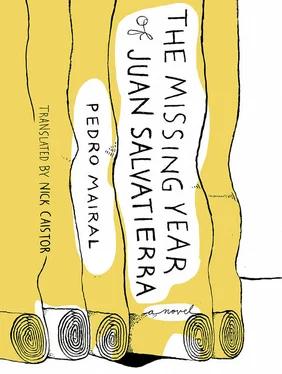After we had released three of the four sides of the painting, we stopped for a rest. By now it was already five in the afternoon. Luis sat smoking in one of the dusty armchairs. From time to time he came out with a skeptical remark:
“We should have left it here to rot, Miguel. We’re sticking our noses in where we’re not wanted. You shouldn’t poke around in the past like this, should you?”
I sat in the other armchair and said nothing. He went on:
“What happens to someone belongs to his own time; you shouldn’t dig it up again. There’s a reason for it being forgotten. Everybody has to live their own life and leave the dead in peace.”
I reminded him that neither of us had exactly had much of a life of our own. I thought of him going to the supermarket every night after work to buy a chicken breast and a bit of salad, but didn’t mention it.
I was causing Luis to lose his bearings, because he had always fought against Salvatierra’s omnipresence by trying to bury it in time. That was how he built his life. And now here I was forcing him to struggle with it as I did; in other words, scouring that enormity until I discovered its limit.
I peered up at the dangling canvas and, trying to justify myself to Luis to some extent, I said:
“Do you remember the gesture he made in the clinic when we asked him what to do with his painting?”
“He did this,” said Luis, copying the offhand gesture Salvatierra had made.
“Yes, but after that he lifted his finger to his cheek and signed ‘Keep an eye on her,’ pointing to mom.”
“So?”
“At the time I thought he meant ‘Keep an eye on your mother, take care of her.’ Now I think he was saying: ‘Do what you like with the canvas, but keep an eye on mom, don’t let her see the things I painted.’”
“That’s possible… He wasn’t keen on it all coming to light.”
“OK, but it’s done now. It can’t offend anyone.”
We fell silent so as not to carry on arguing over the same old thing.
“We have to leave it over here on the Uruguayan side,” said Luis, changing the topic. “We can give it to Ibáñez. That way we’ll have at least one roll outside Argentina.”
We set to work again, in a hurry because Aldo, Boris and Hanna would be waiting for us and the barbecue. This last part was the hardest, because of the blisters. I had to wrap a handkerchief round my hand. We freed a section showing the river: empty boats moored in the morning chill; boats clustered in mid-stream, with men in some sort of clandestine meeting; two men fighting on the shore. It was all very mysterious, a bit frightening. We had no idea what we would find next.
Towards the end of this river sequence, a naked black woman appeared, like a lost soul, running away through the persicaria branches and foliage. As we started to lower it, I noticed that this part had been stitched up, with a diagonal repair. It was the slash Fermín Ibáñez had made during the brawl in the shed that night, when I was eleven.
When I told Luis this, he didn’t seem interested, or was too exhausted to reply. He didn’t say a word until we had completely finished our work. Once the whole canvas was on the floor, we rolled it up and pushed it over to a window. It occurred to Luis that we should roll it up again, but with a pole in the middle so we could carry it on our shoulders. We used the branch that had served as a lever. We pushed the canvas out of the window and carried it between us. It weighed as much as a grown man.
We reached the river as the sun was setting. Ibáñez was waiting for us. Seeing us arrive, he pulled in some fishing lines and helped us load the canvas onto his boat. We asked him if he could take us across to the other side.
“Yes… but there’s the Coast Guard,” he said.
“What can they do to us?” I asked.
“Well… they don’t like people crossing at night…”
“How much would you charge us?” I asked.
“Fifty.”
Luis took out fifty pesos and gave it to him.
First we went to Ibáñez’s place and left the roll there. We wrapped it in a tarpaulin and covered it with sheets of corrugated iron. Ibáñez helped us without a word. Seeing his willingness to lend a hand, I asked him if he knew of anyone who had a bigger boat, a boat that could ship things across at night, because at most we could take two rolls at a time in his. He gave a rather embarrassed smile and asked what we wanted to get across.
“More rolls like this one,” I told him.
“How many?”
“About sixty.”
He thought about it for a few moments.
“When are you thinking of doing this?”
“Tomorrow or the next day at the latest.”
“When you come, I’ll have something for you.”
We climbed back into his boat. Night was falling slowly. Ibáñez began to row, the prow pointed directly towards the Argentine shore. Every so often he raised his oars and took a rest. To arrive more quickly, we decided to head straight across and then follow the shoreline until reaching the shed. Our guests must be worried. We could walk to our house and come back the next day for the car, which we had left at the Customs quay. All three of us were quiet. The only sounds were the oars, the water slapping against the sides of the boat, and Ibáñez’s breathing. Then the horseflies started to pester us, buzzing round our ears.
On the way we caught sight of a motorboat with powerful searchlights. Ibáñez saw it too, but said nothing. He went on rowing, keeping his rhythm. The boat sped by without paying us any attention.
“That was the Coast Guard,” he said when it had gone. “They’re a real pain in the ass.”
Night drew quickly in, until we could barely make out each other’s faces, only Ibáñez’s dark silhouette against the orange sky. During one of his rests, I asked if he wanted me to row.
“No, I’m fine,” he said, and then seemed to freeze for an instant. I wondered what he could be doing. All of a sudden, his hand shot out and he caught a horsefly that was bothering him in mid-air. He flicked it into the river and went on rowing.
Dumbfounded, I sat there saying nothing, staring at his profile. Who was this man rowing us? I was unnerved and confused. We were in mid-river, with only a few lights twinkling on the far bank.
We headed downstream towards the old jetty.
“Be careful you don’t make any noise or light a cigarette around here. They take potshots at any boats passing nearby.”
“Why’s that?” asked Luis.
“For fun, to practice their shooting,” said Ibáñez. “Lots of drugged kids.”
In the silence we heard a commotion a few blocks away, like a big party, and saw a glow in the sky. A bright patch of light.
We felt the prow of the boat run into sand and jumped out.
“We’ll see you in a few days,” said Luis.
“Have a good time,” said Ibáñez, then began to row off.
He was about to disappear in the darkness when I called out to him:
“Ibáñez?”
“What?”
I tried to see him, but he had been swallowed up by the night. His voice though still seemed close, perhaps because of the strange effect that makes sound skim off smooth water without losing strength.
“Is your mother dead?”
“Yes, a long time ago,” he said out of the shadows.
“Was she black?”
“Yes, she was.”
“And your father?”
“I never knew him.”
“Don’t you know anything about him?”
He didn’t reply for a moment, and then his voice sounded more distant:
“Only that he was mute.”
Luis climbed the bank and began to walk quickly away, without looking back. Had he heard what I’d heard?
Читать дальше












